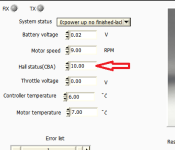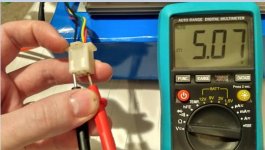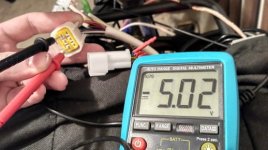Hi guys, long-ish time lurker here.
This is my first post, and already I need some help from the more experienced. Also sorry for the wall of text ahead...
Problem: Hall sensor detection in my Sabvoton 72150 / MXUS 3k combo, I guess...
A little background for those interested:
this motor/controller combo was previously powered by a 52v battery with no problems. But I wanted a lot more range on my bike, so I decided to build my own battery. While at it, why not also up the voltage... so I made 72v35Ah thingy. Even before installing the battery, I feared that the power would overheat my motor (Justin's motor simulator confirmed this). So I decided on adding Statorade to my motor and see how things go from there.
Opening one side of the motor (the cable side) I managed to get just enough space to squeeze some sealant between the side plate and the part between the bolts - it barely moved, as if stuck against a bearing. The other side plate (the chain side) went a lot smoother, adding the ferrofluid was no problem. Then it was sealed as well with silicon based engine gasket sealant. After installing the battery, the fun stopped.
When I twisted the throttle the motor just "hiccupped" forwards and the power was cut off. After lifting it off the ground it spun with no problems. Also when the load was minimal (rider dismounted) and with only a light pull on the throttle it seemed to work (up to around 5Amps of current).
Bridging the BMS power-leads did not help, also the battery rutinely powered a 1 kW hair dryer during testing (I think this rules out a faulty BMS).
When I let the Sabvoton software do a Hall test, it always comes out as "fail", regardless of switching phase leads (as suggested by the software manual.
When turning the wheel by hand while connected to the software, I can see the "Hall status(CBA)" changing in a weird sequence. Not a 123456 , but something like 153624 or something simillar. But it changes at least... However, the automatic Hall test seems to always get stuck cycling between positions 1 5 3 , spinning the wheel very very slightly back and forth repeatadly. Again, there was no such issue before.

Powering the Hall sensors with 5V , measuring voltage with my multimeter and turning the wheel manually also resulted in changing voltages of the Hall output.
But I read somewhere here that the Hall sensors are "ground referenced" - I assume it means the voltage measured should be between the Output and 0V (ground) wires. But mine were only measurable between Output and +5V (positive). Not sure if this is right or not.
I have no idea what else to do, I really really really dont want to disassemble the motor just to check inside (as if there's something to be seen, ha!). But I will do it when I'm 100% sure the Halls are dead and need replacement.
But if the Halls were damaged by the fluid/sealant, would they register in the software/multimeter?
Is is possible that the Halls are okay and there's something entirely else wrong?
If you could come up with any possible solution, please be so kind and share it with me.
Thanks in advance,
Frankie
This is my first post, and already I need some help from the more experienced. Also sorry for the wall of text ahead...
Problem: Hall sensor detection in my Sabvoton 72150 / MXUS 3k combo, I guess...
A little background for those interested:
this motor/controller combo was previously powered by a 52v battery with no problems. But I wanted a lot more range on my bike, so I decided to build my own battery. While at it, why not also up the voltage... so I made 72v35Ah thingy. Even before installing the battery, I feared that the power would overheat my motor (Justin's motor simulator confirmed this). So I decided on adding Statorade to my motor and see how things go from there.
Opening one side of the motor (the cable side) I managed to get just enough space to squeeze some sealant between the side plate and the part between the bolts - it barely moved, as if stuck against a bearing. The other side plate (the chain side) went a lot smoother, adding the ferrofluid was no problem. Then it was sealed as well with silicon based engine gasket sealant. After installing the battery, the fun stopped.
When I twisted the throttle the motor just "hiccupped" forwards and the power was cut off. After lifting it off the ground it spun with no problems. Also when the load was minimal (rider dismounted) and with only a light pull on the throttle it seemed to work (up to around 5Amps of current).
Bridging the BMS power-leads did not help, also the battery rutinely powered a 1 kW hair dryer during testing (I think this rules out a faulty BMS).
When I let the Sabvoton software do a Hall test, it always comes out as "fail", regardless of switching phase leads (as suggested by the software manual.
When turning the wheel by hand while connected to the software, I can see the "Hall status(CBA)" changing in a weird sequence. Not a 123456 , but something like 153624 or something simillar. But it changes at least... However, the automatic Hall test seems to always get stuck cycling between positions 1 5 3 , spinning the wheel very very slightly back and forth repeatadly. Again, there was no such issue before.

Powering the Hall sensors with 5V , measuring voltage with my multimeter and turning the wheel manually also resulted in changing voltages of the Hall output.
But I read somewhere here that the Hall sensors are "ground referenced" - I assume it means the voltage measured should be between the Output and 0V (ground) wires. But mine were only measurable between Output and +5V (positive). Not sure if this is right or not.
I have no idea what else to do, I really really really dont want to disassemble the motor just to check inside (as if there's something to be seen, ha!). But I will do it when I'm 100% sure the Halls are dead and need replacement.
But if the Halls were damaged by the fluid/sealant, would they register in the software/multimeter?
Is is possible that the Halls are okay and there's something entirely else wrong?
If you could come up with any possible solution, please be so kind and share it with me.
Thanks in advance,
Frankie



